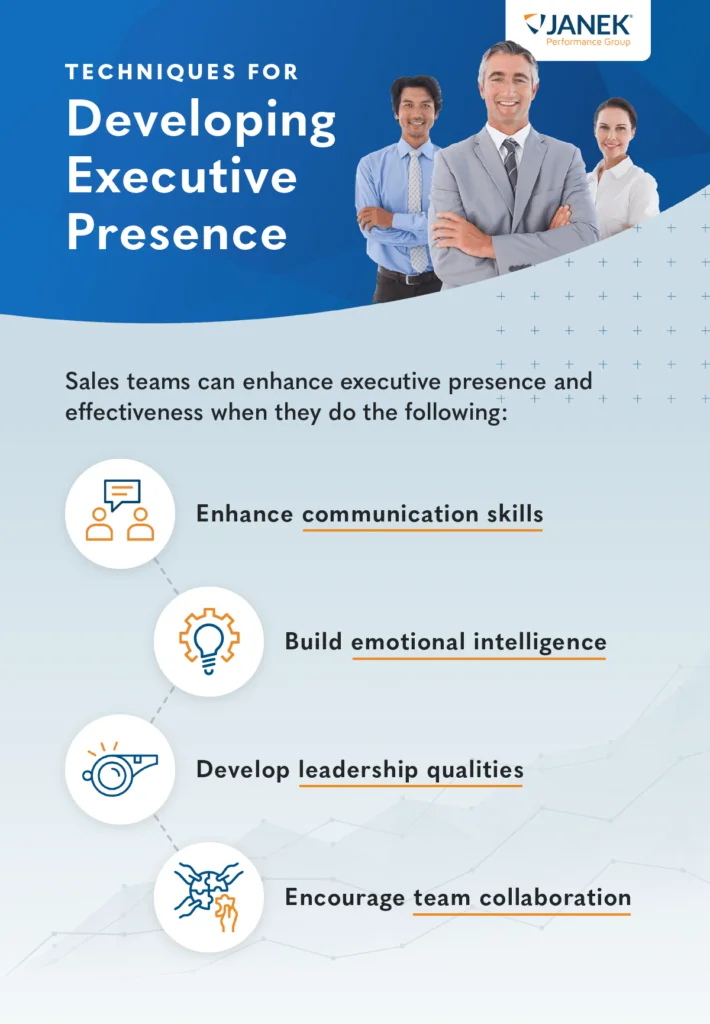How to Develop Executive Presence with Enterprise Sales Teams

In today’s competitive business landscape, enterprise sales teams face unique challenges when trying to close clients. The market is difficult, and they’re competing for clients on a global scale.
To excel in this demanding environment, sales professionals must cultivate a strong executive presence and develop the confidence to navigate complex sales cycles and build lasting client relationships. The good news is that developing executive presence and confidence can be a simple process.
In this article, we will explore the essential aspects of developing presence and confidence for enterprise sales, including the tools and strategies needed to overcome obstacles and achieve success.
Understanding Executive Presence in Sales

Executive presence is a critical component of success in enterprise sales. It encompasses a range of qualities that enable sales professionals to build respect, cultivate trust and influence decision-makers. Some key characteristics of executive presence include:
- Confidence and self-assurance
- Clear and articulate communication
- Adaptability and flexibility
- Emotional intelligence and empathy
- Strategic thinking and problem-solving skills
Understanding executive presence in sales is crucial because it directly impacts client relationships and sales outcomes. Sales professionals with a strong executive presence are better equipped to:
- Establish credibility and build trust with clients.
- Navigate complex decision-making processes.
- Influence key stakeholders and decision-makers.
- Overcome objections and negotiate effectively.
- Adapt to changing client needs and market conditions.
By cultivating executive presence, sales teams can enhance their ability to connect with clients, demonstrate value and, ultimately, drive revenue growth.

Techniques to Develop Executive Presence
Developing executive presence is an ongoing process that requires intentional effort and practice. The following techniques can help sales professionals enhance their presence and effectiveness in person and during sales calls.
1. Enhancing Communication Skills
Clear, assertive communication is the foundation of executive presence. Sales professionals must be able to articulate their ideas, listen actively and adapt their communication style to different audiences. To improve communication skills, sales teams can:
- Practice active listening: Active listening involves fully concentrating on what the client says, maintaining eye contact, providing verbal affirmations and asking clarifying questions to understand their needs and concerns.
- Develop a clear, concise and persuasive communication style: Sales professionals should practice delivering elevator pitches, summarizing complex ideas and compellingly presenting solutions.
- Enhance nonverbal communication: Sales professionals can practice maintaining a relaxed yet professional demeanor, using appropriate hand gestures to emphasize points and varying their vocal pitch and pace to keep clients engaged.
- Cultivate cross-cultural and cross-industry communication skills: Sales professionals should understand different cultural norms, communication styles and industry-specific terminology.
2. Building Emotional Intelligence
Emotional intelligence is the ability to recognize, understand and manage one’s own emotions and those of others. Empathy and emotional intelligence are essential for building strong client relationships and navigating complex sales challenges.
Developing emotional intelligence requires practicing self-awareness and self-regulation, especially in high-pressure situations. It also requires sales professionals to consider their clients’ perspectives and understand their unique challenges, goals and motivations. Learning to navigate difficult conversations is also crucial to building emotional intelligence.
3. Developing Leadership
Leadership qualities and executive presence are closely linked. Sales professionals with concrete leadership skills can better influence clients, drive change and achieve results.
Developing leadership involves cultivating a strategic mindset, focusing on long-term goals and modeling desired behaviors. It also requires embracing accountability, taking ownership of outcomes and inspiring sales team members to achieve their best.
4. Encouraging Team Collaboration
Effective team collaboration is essential for building a strong executive presence across the sales team. When sales teams work together seamlessly, they can leverage collective expertise, share best practices and present a united front to clients.
Encouraging team collaboration involves:
- Fostering open communication and knowledge sharing.
- Promoting cooperation and cross-functional teamwork.
- Celebrating team successes.
- Learning from challenges.
- Creating a culture of continuous improvement and growth.
Strategies for Building Confidence in Sales Teams
Confidence is critical for sales teams. It can help them overcome sales challenges, exude confidence during sales calls, close sales and interact with potential clients and competitors. Building the confidence of sales team members requires a combination of training, coaching and a growth mindset.

Training and Development Programs
Continuous learning and development are essential for building confidence and staying ahead of industry trends. Effective training programs should focus on product and market knowledge, sales skills and techniques, communication and presentation skills, and negotiation and objection handling.
Proper preparation and practice can significantly increase the confidence of all sales team members, even those who are not naturally confident. Through role-playing exercises, workshops and hands-on training, they can refine their skills and build confidence in their abilities.
Leveraging Sales Coaching
One-on-one sales coaching is a powerful tool for building confidence and addressing individual development needs. Effective sales coaching should provide regular feedback and guidance, identify strengths and areas for improvement, set clear goals, and celebrate successes while learning from challenges. With regular personalized coaching, sales professionals can build the confidence and skills needed to excel in their roles.
Encouraging a Growth Mindset
A growth mindset is the belief that abilities and skills can be developed through dedication and hard work. Encouraging a growth mindset within the sales team can foster resilience, adaptability and a positive attitude toward overcoming sales challenges. To promote a growth mindset, organizations should:
- Embrace challenges as opportunities for growth.
- Encourage experimentation and learning from failures.
- Celebrate effort and progress, not just outcomes.
- Create a culture of continuous feedback and improvement.
By cultivating a growth mindset, sales teams can confidently approach challenges and adapt to changing market conditions.
Avoiding Common Pitfalls in Developing Executive Presence
While developing executive presence is crucial for success in enterprise sales, it’s essential to be aware of common pitfalls that can undermine these efforts. Some behaviors that may be mistaken for executive presence but can hinder sales performance include:
- Overconfidence: Sales professionals should strive to project confidence based on their knowledge and skills rather than an inflated sense of self-importance. Arrogance can alienate clients and damage relationships, whereas genuine confidence with humility can foster trust and respect.
- Rigidity and inflexibility: Sales professionals who are too rigid in their approach or unwilling to consider alternative perspectives may struggle to build rapport and find common ground with clients. It’s important to balance confidence in one’s abilities with openness to new ideas and a willingness to adjust strategies when necessary.
- Neglecting emotional intelligence: While technical expertise and strategic thinking are important aspects of executive presence, neglecting emotional intelligence can undermine sales performance. Sales professionals who fail to recognize and respond to client emotions or manage their own emotions in high-pressure situations may find it challenging to build strong relationships and navigate complex sales cycles.
By being aware of these common pitfalls and actively working to avoid them, sales teams can develop a more authentic and effective executive presence that drives success in enterprise sales.

Unlocking Sales Success With Janek Performance Group
Developing a strong executive presence and building confidence are essential for enterprise sales teams to thrive in today’s competitive landscape. By investing in the techniques and strategies outlined in this article, your organization can equip your sales professionals with the skills and mindset needed to overcome sales obstacles, build lasting client relationships and drive revenue growth.
At Janek Performance Group, we provide holistic, custom-tailored, research-based sales training solutions that can drive positive long-term behavior change within sales teams. Our award-winning programs are designed to help you improve sales performance, increase confidence in skills, reduce turnover, foster a consistent sales approach and enable adaptation to market changes.
If you’re ready to unlock the full potential of your enterprise sales team, contact us today to learn more about our results-driven training solutions.

Updated 1/15/2025

- Account Planning (11)
- Awards (49)
- Client Testimonial (37)
- Personal Branding (19)
- Podcast (11)
- Research (70)
- Sales Career Development (87)
- Sales Coaching (156)
- Sales Consulting (137)
- Sales Culture (170)
- Sales Enablement (354)
- Sales Leadership (110)
- Sales Management (248)
- Sales Negotiation (16)
- Sales Prospecting (124)
- Sales Role-Playing (18)
- Sales Training (234)
- Selling Strategies (263)
- Soft Skills (70)
- Talent Management (94)
- Trusted Advisor (27)
- Virtual Selling (49)
- Webinar (9)


























